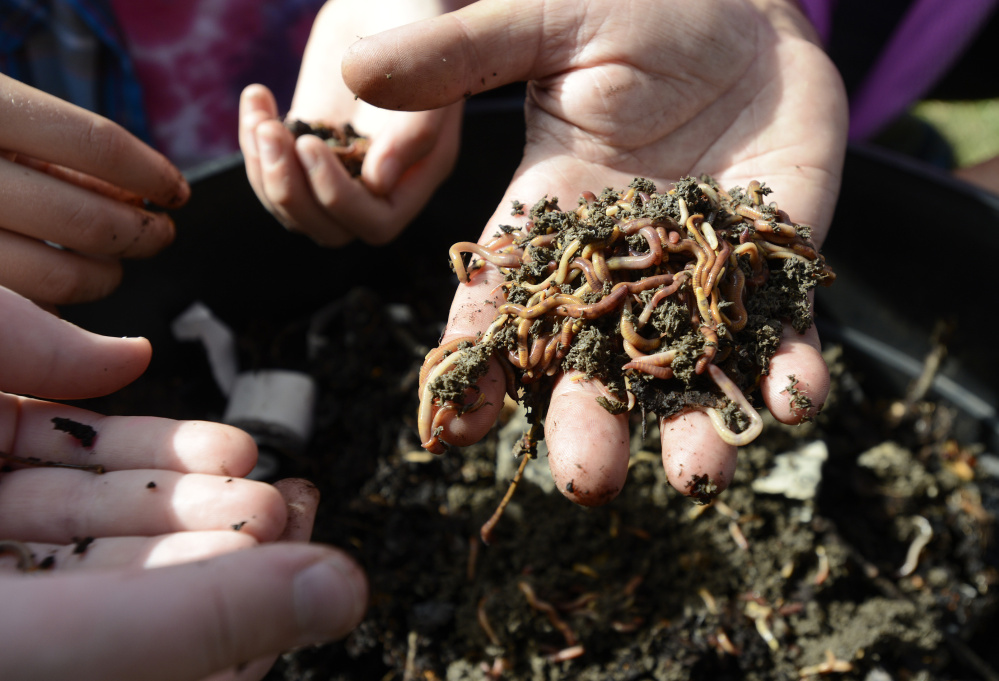Like many elementary schools around the state, Longfellow Elementary School in Portland has a school garden, and students grow seedlings in the classroom to plant, study the life cycle of plants and eventually harvest the food they’ve grown and use it in a school lunch.
But fifth-graders are taking their environmental studies a step further, with a yardscaping project, a yearlong vermiculture project and an entire study unit on watersheds.
“It’s wonderful. These kids are so far beyond where we were as kids,” said Richard Johnson, a fifth-grade teacher at the school.
On a sunny fall morning recently, Johnson was out in the garden, showing students how to create their own worm bins with damp newsprint, dried leaves and organic material from around the school’s garden area and about 15-18 red worms from a master worm bin.
They’ll keep their worm bins in the classroom, add their lunchtime organic food scraps and other material over the winter, and by spring have plenty of worm castings to add back to the very yard where they were gathered. Along the way, they’ll be doing soil tests in the school gardens to determine what they need to add to make a healthy soil and how various soils affect plant growth.
“They see how it works and then they go about actually using that knowledge,” said Johnson, who won an Outstanding Educator award from the Cumberland County Soil & Water Conservation District for his work creating the curriculum.
Johnson said the Longfellow students take those sustainability lessons home. One student, after studying watersheds and the impact of phosphorus and oily street runoff on local waterways, insisted her parents wash their car on the lawn – not the driveway – so the water would have a chance to filter through the grasses and soil instead of dumping straight into the city’s sewer system.
Even as he spoke, another example of how sustainability surrounds and infuses a young person’s world today unfolded as a student ran over, holding up his pencil: “Did you know this pencil is made out of recycled paper?” he asked.
Last year, fifth-graders planted flowers, clover and other plants around two major storm drains on the Longfellow campus that previously were surrounded by dirt. The “rain garden” is an example of how to make the world a cleaner place, students said.
“We do recycling and composting at home, to make sure stuff doesn’t go into landfills,” said Caelistis Paulus, 10. At school, the worm bins and the fertilizer they’ll eventually produce, she said, “are making it so the soil can grow more food and make the Earth a much healthier place.”
Getting involved in their food and environment fuels other healthy lifestyle choices, too.
Paulus said she helps take care of her family’s home garden, and that has led to her helping cook and prepare meals, because she feels like it’s “her” food. It’s also made her aware of the difference between store-bought and homegrown food, making her a smarter consumer long before she’s wielding a debit card in a store herself.
“I like a lot of the herbs we grow, and it’s healthier,” she said.
For Nolan Raymond, 11, recycling and composting at home is not just good for the environment, but he’s made the financial connection as well: Less trash means spending less money on the pay-as-you-throw bags Portland uses.
“If you are an adult, like the last generation, then it wasn’t so much about composting,” he said. “Now, kids have the habit of it.”
Send questions/comments to the editors.




Success. Please wait for the page to reload. If the page does not reload within 5 seconds, please refresh the page.
Enter your email and password to access comments.
Hi, to comment on stories you must . This profile is in addition to your subscription and website login.
Already have a commenting profile? .
Invalid username/password.
Please check your email to confirm and complete your registration.
Only subscribers are eligible to post comments. Please subscribe or login first for digital access. Here’s why.
Use the form below to reset your password. When you've submitted your account email, we will send an email with a reset code.